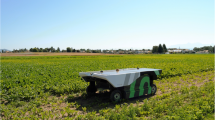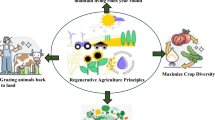Abstract
The following study investigates and identifies research trajectories pertaining to the digital transition of agriculture and food production. While a vast amount of research aims to discover new technologies, or to apply them in novel ways, their large-scale implications as regards data ownership and data governance are relatively overlooked. Regulatory interventions are demanded to steer data ownership and data governance towards the ‘common good’. It is thus necessary to identify how research can contribute to the discussion on sensitive areas of policymaking that have been the object of environmental regulation, including the EU Green Deal and UN Sustainable Development Goals. In the light of this necessity, this paper identifies issues with ethical relevance emerging from the adoption of new technologies in agritech, including Artificial Intelligence techniques and Internet of Things applications. To do so, this study attempts to systematise and categorise existing research trends by clearly identifying their scope and understanding the relationships that exist among them. The results of this enquiry show that five interconnected research trajectories - namely, technical solutions, data governance, data ownership, ethics and law - can foster the discussion on agritech transition. The connections between these research areas can be understood in terms of a descriptive and a prescriptive perspective.
S. Sapienza—This study has been funded by Programma Operativo Nazionale (PON) “Ricerca e Innovazione” 2014–2020 CCI2014IT16M2OP005, by the Italian Ministry of University and Research approved with Decision CE C(2015)4972 of 14 July 2015, in the light of D.M. 1062 of 10 August 2021.
Access this chapter
Tax calculation will be finalised at checkout
Purchases are for personal use only
Similar content being viewed by others
Notes
- 1.
Communication From the Commission to the European Parliament, the European Council, the Council, the European Economic and Social Committee and the Committee of the Regions “The European Green Deal” COM/2019/640 final.
- 2.
[[“Big AND Data” OR “Artificial AND Intelligence”] AND [“Smart AND Farming” OR “Digital AND Agriculture” OR “Agritech”] AND “Review”] was the query used to identified papers that contain literature reviews on the topic under scrutiny. Research was performed on academic databases (namely, Scopus, Web of Science, Google Scholar) using title-based and topic-based queries and refined to avoid duplicates.
- 3.
That is the definition of ‘personal data’ under Article 4(1) of the EU General Data Protection Regulation (Reg. 2016/679).
- 4.
Regulation (EU) 2016/679 of the European Parliament and of the Council of 27 April 2016 on the protection of natural persons with regard to the processing of personal data and on the free movement of such data, and repealing Directive 95/46/EC [2016] OJ L 119/1.
- 5.
Regulation (EU) 2018/1807 of the European Parliament and of the Council of 14 November 2018 on a framework for the free flow of non-personal data in the European Union [2018] OJ L 303/59.
- 6.
Proposal for a Regulation of the European Parliament and of the Council on harmonised rules on fair access to and use of data.
- 7.
Proposal for a Regulation of the European Parliament and of the Council on European data governance - COM/2020/767 final.
- 8.
Proposal for a Proposal for a regulation of the European Parliament and of the council laying down harmonised rules on artificial intelligence (Artificial Intelligence Act) and amending certain Union legislative acts - COM/2021/206 final.
- 9.
Regulation (EC) No 178/2002 of the European Parliament and of the Council of 28 January 2002 laying down the general principles and requirements of food law, establishing the European Food Safety Authority and laying down procedures in matters of food safety [2002] OJ L 31/1. This Regulation has been deeply amended by the 2021 Transparency Regulation to provide more public access to food safety information.
References
Floridi, L.: The Fourth Revolution: How the Infosphere is Reshaping Human Reality. OUP Oxford, London (2014)
Floridi, L.: The green and the blue: naïve ideas to improve politics in a mature information society. In: Öhman, C., Watson, D. (eds.) The 2018 Yearbook of the Digital Ethics Lab. DELY, pp. 183–221. Springer, Cham (2019). https://doi.org/10.1007/978-3-030-17152-0_12
Wolfert, S., et al.: Big data in smart farming-a review. Agric. syst. 153, 69–80 (2017)
Miles, C.: The combine will tell the truth: on precision agriculture and algorithmic rationality. Big Data Soc. 6(1), 2053951719849444 (2019)
Bacco, M., et al.: The digitisation of agriculture: a survey of research activities on smart farming. Array 3, 100009 (2019)
van Es, H.M., et al.: Digital agriculture in New York State: report and recommendations. Cornell University, Ithaca, NY (2016)
Sonka, S.: Big data and the ag sector: more than lots of numbers. In: International Food and Agribusiness Management Review, vol. 17, no. 1030-2016-82967, pp. 1–20 (2014)
Mulla, D.J.: Twenty five years of remote sensing in precision agriculture: key advances and remaining knowledge gaps. Biosyst. Eng. 114(4), 358–371 (2013)
Lytos, A., et al.: Towards smart farming: systems, frameworks and exploitation of multiple sources. Comput. Netw. 172, 107147 (2020)
Rossiter, D.G.: ALES: a framework for land evaluation using a microcomputer. Soil Use Manage. 6(1), 7–20 (1990)
Bielecka, E.: GIS spatial analysis modeling for land use change. a bibliometric analysis of the intellectual base and trends. Geosciences 10(11), 421 (2020)
Balafoutis, A.T., et al.: Smart farming technologies – description, taxonomy and economic impact. In: Pedersen, S.M., Lind, K.M. (eds.) Precision Agriculture: Technology and Economic Perspectives. PPA, pp. 21–77. Springer, Cham (2017). https://doi.org/10.1007/978-3-319-68715-5_2
Vu, Q., Raković, M., Delic, V., Ronzhin, A.: Trends in development of UAV-UGV cooperation approaches in precision agriculture. In: Ronzhin, A., Rigoll, G., Meshcheryakov, R. (eds.) ICR 2018. LNCS (LNAI), vol. 11097, pp. 213–221. Springer, Cham (2018). https://doi.org/10.1007/978-3-319-99582-3_22
Porter, M.E., Heppelmann, J.E.: How smart, connected products are transforming competition. Harvard Bus. Rev. 92(11), 64–88 (2014)
Dagar, R., Som, S., Khatri, S.K.: Smart farming-IoT in agriculture. In: 2018 International Conference on Inventive Research in Computing Applications (ICIRCA). IEEE, pp. 1052–1056 (2018)
Mendes, J., et al.: Smartphone applications targeting precision agriculture practices? A systematic review. Agronomy 10(6), 855 (2020)
Baumüller, H.: Towards smart farming? Mobile technology trends and their potential for developing country agriculture. In: Handbook on ICT in Developing Countries, pp. 191–201. River Publishers, Delft (2017)
Tian, F.: An agri-food supply chain traceability system for China based on RFID & blockchain technology. In: 2016 13th International Conference on Service Systems and Service Management (ICSSSM), pp. 1–6. IEEE (2016)
Kamath, R.: Food traceability on blockchain: Walmart’s pork and mango pilots with IBM. J. Br. Blockchain Assoc. 1(1), 3712 (2018)
Carrefour. Food blockchain. https://www.carrefour.com/en/group/food-transition/food-blockchain (2018). Accessed 05 May 2021
Kamilaris, A., Fonts, A., Prenafeta-Boldú, F.X.: The rise of blockchain technology in agriculture and food supply chains. Trends Food Sci. Technol. 91, 640–652 (2019)
Hoffman, A., Munsterman, R.: Dreyfus teams with banks for first agriculture blockchain trade (2018)
Penco, L., et al.: Mobile augmented reality as an internationalization tool in the “Made In Italy’’ food and beverage industry. J. Manage. Gov. 25(4), 1179–1209 (2021)
Violino, S., et al.: Are the innovative electronic labels for extra virgin olive oil sustainable, traceable, and accepted by consumers? Foods 8(11), 529 (2019)
Acuti, D., et al.: The effects of QR delivered content on perceived product value. J. Strateg. Mark. 1–23 (2020)
Hitzler, P., et al.: Advancing agriculture through semantic data management. Semant. Web 12(4), 543–545 (2021)
Drury, B., et al.: A survey of semantic web technology for agriculture. Inf. Process. Agric. 6(4), 487–501 (2019)
Ehlers, M.H., Huber, R., Finger, R.: Agricultural policy in the era of digitalisation. Food Policy 100, 102019 (2021)
Garske, B., Bau, A., Ekardt, F.: Digitalization and AI in european agriculture: a strategy for achieving climate and biodiversity targets? Sustainability 13(9), 4652 (2021)
De Beer, J.: Ownership of open data: governance options for agriculture and nutrition. Wallingford: Global Open Data for Agriculture and Nutrition (2016)
Rasmussen, N.: From precision agriculture to market manipulation: a new frontier in the legal community. Minn. JL Sci. Tech. 17, 489 (2016)
Carbonell, I.: The ethics of big data in big agriculture. Internet Policy Rev. 5(1), 13 (2016)
Sapienza, S., Vedder, A.: Principle-based recommendations for big data and machine learning in food safety: the P-SAFETY model. AI Soc. 1–16 (2021). https://doi.org/10.1007/s00146-021-01282-1
Yeung, K.: Algorithmic regulation: a critical interrogation. Regul. Gov. 12(4), 505–523 (2018)
Floridi, L., Taddeo, M.: What is Data Ethics? Phil. Trans. R. Soc. A 374(2083), December 2016
Mittelstadt, B.D., Floridi, L.: The ethics of big data: current and foreseeable issues in biomedical contexts. Sci. Eng. Ethics 22(2), 303–341 (2015). https://doi.org/10.1007/s11948-015-9652-2
Sapienza, S.: Explanations in risk analysis: responsibility, trust and the precautionary principle. Forthcoming in the Proceedings of the 4th International Workshop on eXplainable and Responsible AI and Law (XAILA2021@ICAIL) at the 18th International Conference on Artificial Intelligence and Law (ICAIL 2021) (2021). https://www.geist.re/_media/xaila:xaila2021icail_paper_6.pdf
van der Burg, S., Wiseman, L., Krkeljas, J.: Trust in farm data sharing: reflections on the EU code of conduct for agricultural data sharing. Ethics Inf. Technol. 23(3), 185–198 (2020). https://doi.org/10.1007/s10676-020-09543-1
Taddeo, M., Floridi, L.: How AI can be a force for good. Science 361(6404), 751–752 (2018)
Floridi, L., Cowls, J., King, T.C., Taddeo, M.: How to design AI for social good: seven essential factors. In: Floridi, L. (ed.) Ethics, Governance, and Policies in Artificial Intelligence. PSS, vol. 144, pp. 125–151. Springer, Cham (2021). https://doi.org/10.1007/978-3-030-81907-1_9
Floridi, L.: Soft Ethics and the Governance of the Digital. Philos. Technol. 31(1), 1–8 (2018). https://doi.org/10.1007/s13347-018-0303-9
Pagallo, U., Casanovas, P., Madelin, R.: The middle-out approach: assessing models of legal governance in data protection, artificial intelligence, and the Web of Data. Theory Pract. Legislation 7(1), 1–25 (2019)
Jasanoff, S.: The Ethics of Invention: Technology and the Human Future. WW Norton & Company, New York (2016)
AI4People. AI4People — Atomium. (2018). https://www.eismd.eu/ai4people/
Sapienza, S., Palmirani, M.: Emerging data governance issues in big data applications for food safety. In: Kő, A., Francesconi, E. (eds.) EGOVIS 2018. LNCS, vol. 11032, pp. 221–230. Springer, Cham (2018). https://doi.org/10.1007/978-3-319-98349-3_17
Searle, J.R.: How to derive ‘ought’ from ‘is’. In: Hudson, W.D. (ed.) The Is-Ought Question. CP, pp. 120–134. Palgrave Macmillan UK, London (1969). https://doi.org/10.1007/978-1-349-15336-7_13
Author information
Authors and Affiliations
Corresponding author
Editor information
Editors and Affiliations
Rights and permissions
Copyright information
© 2022 The Author(s), under exclusive license to Springer Nature Switzerland AG
About this paper
Cite this paper
Sapienza, S. (2022). Smart Solutions in AgriTech: Research Trajectories in the Digital Transition. In: Kő, A., Francesconi, E., Kotsis, G., Tjoa, A.M., Khalil, I. (eds) Electronic Government and the Information Systems Perspective. EGOVIS 2022. Lecture Notes in Computer Science, vol 13429. Springer, Cham. https://doi.org/10.1007/978-3-031-12673-4_11
Download citation
DOI: https://doi.org/10.1007/978-3-031-12673-4_11
Published:
Publisher Name: Springer, Cham
Print ISBN: 978-3-031-12672-7
Online ISBN: 978-3-031-12673-4
eBook Packages: Computer ScienceComputer Science (R0)




